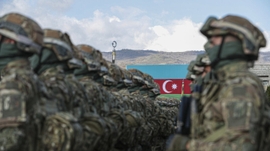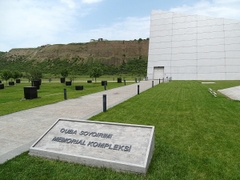The Secretary of Russia’s National Security Council, Sergei Shoigu, and Iranian President Masoud Pezeshkian met in Tehran on August 5 to discuss regional and international developments, as well as the expansion of bilateral relations.
During the meeting, President Pezeshkian expressed appreciation for Russia’s support of the Palestinian people and its condemnation of Israel’s “criminal actions,” according to the official website of the Iranian president.
Pezeshkian went on to accuse Israel of violating international conventions and escalating conflicts in the region. He specifically condemned the July 31 assassination of Hamas Leader Ismail Haniyeh in Tehran, labeling it a “clear violation of all international laws and regulations.”
In reaffirming Iran’s commitment to strengthening bilateral relations, particularly in the political and economic spheres, Pezeshkian identified Russia as a “strategic partner.” He emphasized the importance of cooperation between Iran and Russia on regional and international issues, saying,
“We believe the era of dominance by certain powers, including the United States, is over. The shared positions and cooperation between Iran and Russia in promoting a multipolar world will certainly lead to greater global security and peace.”
Shoigu reciprocated these sentiments, describing Iran as “one of Russia’s key strategic allies in the region.” He expressed satisfaction with the joint efforts of the two countries to create a multipolar world and ensure regional security.
“The relations between the two countries are growing across all sectors, and there are very good prospects for the development of the existing interactions,” Shoigu noted.
He further emphasized the importance of cooperation with Iran in international organizations such as the United Nations, the BRICS group of nations, and the Shanghai Cooperation Organization, stressing that “we will work to expand these areas of collaboration.”
Later that day, Shoigu met with Major General Mohammad Baqeri, Chief of Staff of the Iranian Armed Forces, to discuss “defense and military relations.” Baqeri praised the “strategic, deep, and long-term” relations between the two countries and assured Shoigu that changes in the Iranian government would not affect Tehran-Moscow relations. Additionally, Baqeri expressed Tehran’s openness to trilateral cooperation between Iran, China, and Russia, emphasizing that the era of unilateral dominance by the US is over.
Shoigu underscored Russia’s readiness to cooperate with Iran on regional matters and condemned Haniyeh’s assassination, saying that “there is no doubt that the orchestrators of such crimes seek to fuel tensions in the region.”
Shoigu also met with Ali Akbar Ahmadian, the secretary of Iran’s Supreme National Security Council (SNSC), to discuss regional and international security questions, as well as joint Russian-Iranian economic projects and the strengthening of bilateral relations.
Moscow and Tehran have forged closer ties since Russia’s 2022 invasion of Ukraine, with Iran supplying drones to aid Russia’s military. Shoigu, who served as defense minister from 2012 until his move to the Security Council in May, is regarded as one of Putin’s closest allies.
Shoigu’s visit to Tehran comes amid heightened regional tensions, as Iran has threatened to retaliate for the recent killing of Ismail Haniyeh in Tehran while signaling a desire to avoid an all-out war with Israel.
Previously, Iran launched strikes against Israel in retaliation for what they claimed was an Israeli attack on an Iranian diplomatic compound in Syria in April. In this unprecedented move, almost all of the weapons were intercepted by Israeli air defenses, with support from an international coalition that included the United States, the United Kingdom, France, and Jordan.







 Azerbaijan’s historical biographical film “Taghiyev” has won the Best Feature Film award at the Dehancer Colorist Awards 2024. The film, which chro...
Azerbaijan’s historical biographical film “Taghiyev” has won the Best Feature Film award at the Dehancer Colorist Awards 2024. The film, which chro...
 Azerbaijan has been recognized as one of the safest countries in the world, ranking 90th among 163 countries on the Global Terrorism Index 2025 (GTI).
Azerbaijan has been recognized as one of the safest countries in the world, ranking 90th among 163 countries on the Global Terrorism Index 2025 (GTI).
 The Azerbaijani Defense Ministry has reported ongoing shelling of its army positions by Armenian forces since last week.
The Azerbaijani Defense Ministry has reported ongoing shelling of its army positions by Armenian forces since last week.



